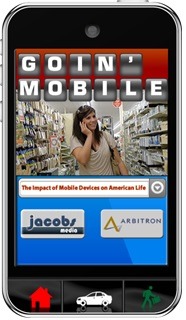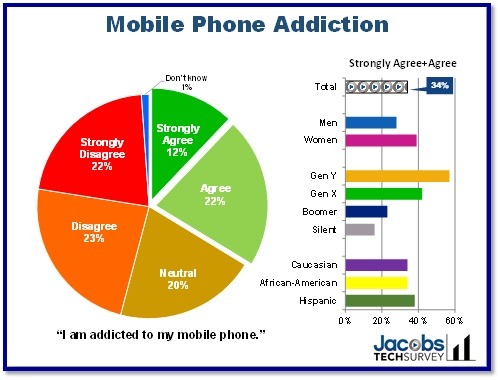The smartphone revolution hasn’t just rocked our worlds. It has changed our culture and the fabric of our everyday lives.
Back in 2010 when we put together the “Goin’ Mobile” project for Arbitron, the smartphone tsunami was just underway. Most people were still using flip phones (or feature phones), and apps were still emerging. That ethnographic study provided us with early insights into how smartphones and apps would become more than just utilities, connecting consumers to everything important in their lives.
In Goin’ Mobile, we saw some very positive things about mobile connectivity, but we also saw the early signs of how the smartphone was beginning to permeate and ultimately dominate everyday life.
And we saw some of the darker sides of the mobile phone movement as well – people driving while using their smartphones, dinner conversations curtailed by everyone staring at their personal screens, and annoying distractions in both the classroom and places of worship.
Today, we take these changes for granted because we are so deeply immersed in the mobile space. It is getting to the point that not owning a smartphone says a lot about one’s place in society. These are issues that we have continued to track in our nationwide Techsurveys.
And last year, we tackled the topic of smartphone addition. To make this determination, we added a question that addressed this issue using this very simple agree/disagree statement:
“I am addicted to my mobile phone.”
And the results were eye-opening. About a third of our respondents agree or agree strongly with that statement. But when you look at our demographic groups on the right-hand side of the chart, you can see that Millennials are especially likely to admit their dependence on their mobile phones. Well more than half fall into that camp.
But what does addiction look like? Most people have had some degree of personal knowledge about being hooked on alcohol or drugs.
But what does it mean to be hopelessly addicted to an object, a gadget, a device?
Fortunately, Chevy has done the heavy lifting for us in the long-form ad below that markets their 4G LTE service. But the underlying message about mobile phone addiction is crystal clear. And you can see it on the faces and in the words of these respondents when they both lose their smartphones, and when they get them back:
https://www.youtube.com/watch?v=ro0UEwuOR1Q&feature=youtu.be
Email recipients, click here to watch the Chevy ad
To make the point about the importance of connectivity in our lives, Chevy goes to great lengths. And while they’re humorous and fun to watch on the one hand, it is hard not to imagine being in that same room with these people, experiencing the heartbreaking loss of the most important device in our lives.
As we learned in more than one panel at our DASH Conference earlier this month, the automakers have come to grips with the notion that the operating system of your smartphone is more important than the make and model of your car. That’s why Apple’s CarPlay and Android Auto platforms are being built into so many new vehicles rolling off the assembly lines.
And it should be a message to radio broadcasters, whether commercial or public, major market or small, diary or PPM. Inclusion in the most important device of our lifetime is an opportunity that many consumer brands and companies simply won’t be able to achieve.
But in radio, this is real estate we can occupy. We have seen the outcome of building a great brand, designing a well-functioning full-featured app, and marketing it on and off the air in our jācapps division, now that we’ve created nearly 1,000 mobile apps.
For too many years, mobile has been more of an afterthought in radio rather than a core strategy. There may have been a time when Americans coveted their transistor radios, but even at the height of that craze, it paled in comparison to our obsession with and addiction to smartphones.
Tapping into consumer mobile dependency ought to be an essential part of every broadcast company’s master strategy. If you need proof, attending an event like CES or even DASH or RAIN is the only stimulus you’d need to energize your company’s involvement and activity in the mobile space.
Or you could just turn on your TV and watch commercials.
Thanks to Gil Edwards for sending me the Chevy video.
We will be asking questions like these in Techsurvey12, launching in January. For information and registration info, click here.
To participate in a free webinar outlining top tech trends in radio culled from our recent Techsurveys, click here.
- What To Do If Your Radio Station Goes Through A Midlife Crisis - April 25, 2025
- A 2020 Lesson?It Could All Be Gone In A Flash - April 24, 2025
- How AI Can Give Radio Personalities More…PERSONALITY - April 23, 2025





Hey, Fred, curious to hear your thoughts about something. Fairly recently, Tim Cook of Apple was talking about how the future of TV is apps, saying how much better it is experienced through apps: “You can search for what you want and watch it when and where you want. And you can interact with it in powerful new ways.”
Granted, some of that may have just been to sell Apple products (maybe more than just “some!”). Here’s my question … do you think the potential is there for listeners to enjoy radio in different ways than they do now via smartphone apps, aside from just being able to listen on their device?
Yes, Chris, and our mobile apps division, jacapps, has the Apple TV SDK to develop apps for that platform. We’re seeing the more people are listening to audio through their TVs, and this is an opportunity. Thanks for bringing it up, and for reading the blog.